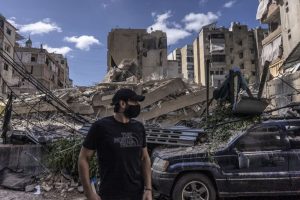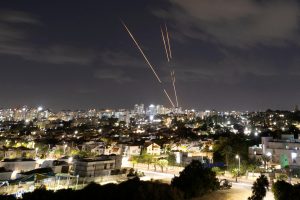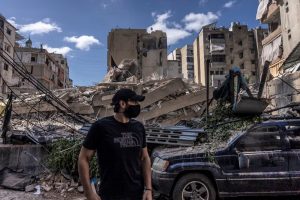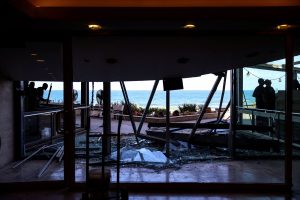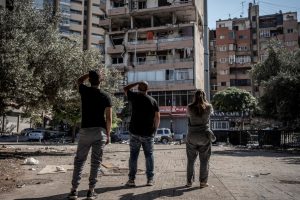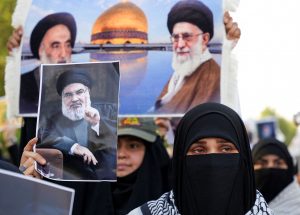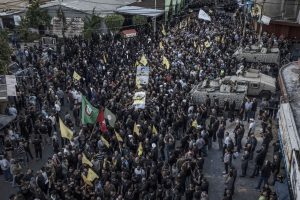DUBAI—With two of Iran’s most powerful proxies—Hezbollah and Hamas—fighting for their lives, Tehran has lost a central pillar of its deterrence strategy, giving Israel an opening to strike what it sees as its most dangerous foe.
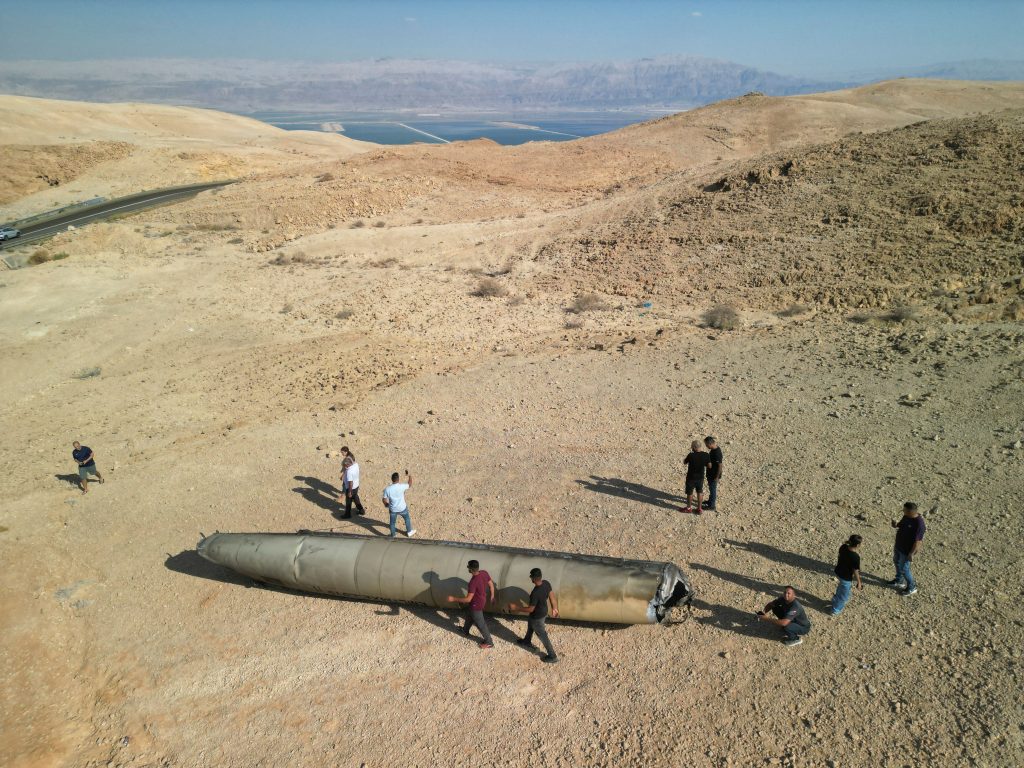
A drone view shows people stand around apparent remains of a ballistic missile lying in the desert, following an attack by Iran on Israel, near the southern city of Arad, Israel October 2, 2024. REUTERS/Amir Cohen
On Tuesday, Iran unleashed one of the biggest ballistic-missile barrages in the history of warfare, aimed at targets across Israel. It said it was retaliating for Israel’s killing of the two militant groups’ leaders, Hassan Nasrallah of Hezbollah and Ismail Haniyeh of Hamas .
Israel has promised a forceful response. Prime Minister Benjamin Netanyahu said Tehran had made “a great error and will pay for it.” When and how Israel will strike back remains unclear, as is the question of whether it would choose to target Tehran’s nuclear program.
Ironically, it was the threat of reprisals by Hezbollah and, to a lesser extent, Hamas, that was supposed to help dissuade Israel from any direct attack on Iran. Now, however, Israel’s success in degrading the two militant organizations, both considered terrorist groups by the U.S., has set the stage for a potentially bigger hit.
“Hezbollah and Hamas are paralyzed temporarily and Iran is exposed,” said former Israeli Prime Minister Naftali Bennett . “Right now, they’re naked, they don’t have the ability to protect themselves. Israel has the greatest opportunity in 50 years to change the face of the Middle East.”
Hamas has been eviscerated as a fighting force by a nearly yearlong Israeli campaign in Gaza, prompted by the militant group’s Oct. 7 attacks on southern Israel that authorities say killed around 1,200 people. Tens of thousands of Palestinians have been killed by the Israeli military in Gaza since then, according to Palestinian health officials.

A drone view shows people stand around apparent remains of a ballistic missile lying in the desert, following an attack by Iran on Israel, near the southern city of Arad, Israel October 2, 2024. REUTERS/Amir Cohen
And Hezbollah, which for much of the past year has pelted northern Israel with projectiles from its vast arsenal of Iranian-supplied rockets and missiles, is in disarray after a series of Israeli blows that have decapitated its leadership and destroyed a significant part of its weapons stockpile.
Large-scale Israeli retaliation for Tuesday’s attack would be a stark difference from its response after a similar Iranian salvo in April , when almost all the Iranian missiles and drones were shot down, with the help of the U.S., Western allies and Arab partners.
At the time, Netanyahu reluctantly acquiesced to President Biden ’s urge to “take the win” and refrain from major military action. Biden on Wednesday called for a “proportionate” Israeli response, saying he wouldn’t support any strike on nuclear sites in Iran, which has been stockpiling uranium enriched to near weapons-grade levels.
Bennett, who isn’t in the current Israeli government, is among those calling on Israeli leaders to seize the moment and look to deliver a devastating blow to Iran by targeting its nuclear facilities, its oil industry and its leadership.
“Now is the time to strike the head of the octopus, otherwise they can recover,” Bennett said.
“Iran has not learned a simple lesson—those who attack the State of Israel pay a heavy price,” warned Israel’s Defense Minister Yoav Gallant .
Iran unleashed its ballistic missiles, which are harder to intercept than the cruise missiles and drones that made up much of April’s attack, after Israel killed much of Hezbollah’s senior leadership over the past two weeks and as Israeli ground forces started pushing across the border to dismantle Hezbollah fortifications in southern Lebanon.
There were no initial reports of widespread damage to vital installations and no Israeli civilians died in Tuesday’s Iranian attack, though some military facilities appear to have been struck. Israel said no aircraft were damaged at its air bases targeted by Iran.
Such an outcome could suggest a more tailored retaliation that would likely focus on Iran’s air defense and missile batteries, said Michael Knights , a senior fellow at the Washington Institute for Near East Policy.
“While we’re going up the escalation ladder, both sides still seem to be keeping within certain limits,” Knights said. “Israeli retaliations always tend to match the reduction in its civilian morale, done as a reassurance that the Israeli qualitative edge is still there and that Israel can hit its enemies back harder than they can hit it. Now, in this case, these Iranian strikes didn’t seem to have hit very hard.”
Hezbollah, which shares the Shiite Islamist ideology of the Iranian regime, is far more intimately linked to Tehran than Hamas, an offshoot of the Sunni Muslim Brotherhood. In fact, the airstrike that killed Nasrallah in southern Beirut also killed the deputy commander of Iran’s Revolutionary Guard Corps, Abbas Nilforoushan . Iran’s ambassador to Beirut was injured days earlier when Israel triggered explosions in pagers used by Hezbollah.
The Sept. 27 assassination of Nasrallah, a towering figure who oversaw Hezbollah for more than three decades, presented Iran with two choices. One was to sit it out as the crown jewel of the “axis of resistance” was being dismantled, a course that would have meant a major loss of face with Iran’s other proxies from Yemen to Syria to Iraq.
The decision it ultimately made—to launch Tuesday’s missile strike on Tel Aviv and Israeli air bases—means that Iran is now facing potentially devastating blows to its own military or civilian infrastructure, opening an escalation spiral against a more powerful foe.
“The Iranians faced two bad options, and they chose one of them,” said retired Maj. Gen. Yaakov Amidror , who served as Netanyahu’s national-security adviser. “If Israel shows that it can penetrate the Iranian system and destroy important targets in Iran, the Iranians will have an even bigger problem and another setback to their dreams.”
While Iran is a much bigger country than Israel, and would be a formidable foe in a land war, the current conflict isn’t a replay of the grinding Iraq-Iran war of the 1980s. Israel is located more than 550 miles and two countries away from Iran. Any direct confrontation between the two would be primarily an air and missile battle where Tehran, with its rudimentary air force and outdated air defenses, is severely outmatched.
“Iran’s air defenses and missiles will run out at some point. Iran doesn’t have the defense industrial capability to churn out missiles at the rate that would be needed to keep the war going, and it won’t be able to buy these missiles elsewhere because the only country that might transfer them, Russia, is using these missiles for its own war in Ukraine,” said Esfandyar Batmanghelidj , chief executive of the Bourse and Bazaar think tank.
Because of that imbalance, Batmanghelidj said, even if there is a significant Israeli response in the coming days to Tuesday’s strikes, it is still in Iran’s interest to just absorb that blow rather than escalate further.
“It doesn’t look good from Tehran’s perspective: It really is stuck between a rock and a hard place,” said Dina Esfandiary , senior adviser on Middle East and North Africa at the International Crisis Group. “They just don’t want to sleepwalk into a war that they know they won’t be able to win.”
The recent blows dealt to Iran and its allies have instilled a spirit of giddiness among some Israeli officials and policymakers, creating a temptation not just to revamp Lebanon’s political makeup that has been dominated by Hezbollah, but maybe even to spur regime change within Iran, which maintained good relations with Israel before the 1979 Islamic revolution.
“When Iran is finally free, and that moment will come a lot sooner than people think, everything will be different,” Netanyahu said in this week’s address to “the noble Persian people.”
Nadim Houry , executive director of the Arab Reform Initiative think tank, warned of the risks of such overreach, which he said reminded him of Israel’s disastrous foray into Lebanon in 1982, which led to the creation of Hezbollah, and the 2003 U.S. invasion of Iraq.
“The danger right now is the temptation of thinking ‘This is a historical moment, let’s remake the Middle East,’” Houry said. “It’s something that has tended in the past to be a foolish and extremely tragic endeavor, one that becomes more complicated and tragic with each round.”
Write to Yaroslav Trofimov at yaroslav.trofimov@wsj.com
